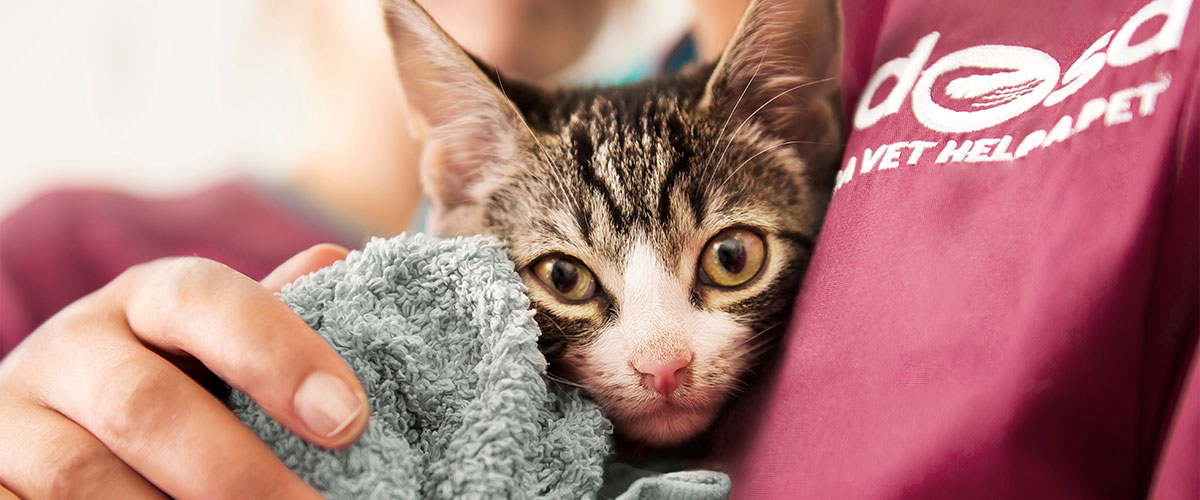Are essential oils toxic to cats?
Essential oils can have a lot of benefits to us humans, whether it’s to help us sleep, treat our skin or simply make the house smell nice. But did you know that what’s good for us isn’t always good for our feline friends?
Veterinary experience shows the potential hazards essential oils can pose to cats. Read below for our vets’ advice on essential oils and cats.
Which oils are toxic to cats?
The majority of essential oils are toxic to cats, but in particular you should be aware of:
- Tea tree
- Peppermint
- Citrus oils
- Ylang ylang
- Lavender
- Wintergreen
- Sweet birch
- Pine
- Eucalyptus
- Cinnamon
- Clove.
Sometimes, even if the essential oil itself doesn’t cause a problem, high fat levels in the carrier oil (used to dilute the essential oil) can also cause tummy upsets.
What are the hazards of essential oils?
Essential oils can be harmful to cats – especially if they are used neat rather than diluted. The risk with toiletries or cosmetics that only contain a very small amount of an essential oil is low, but always check with your vet if you’re not sure about the risk to your cat.
Your cat could come into contact with essential oils in the following ways:
- Direct skin contact. Never apply any essential oils to your cat’s skin. Not only could it cause their skin to have a bad reaction, but they are also at risk of licking it off and accidentally ingesting it.
- Eaten/swallowed. Cats are very clean by nature and can easily swallow oils if they happen across them in the home, as if they get them on their fur they will lick them off. Other risks could be from directly drinking the liquid in reed diffusers, for example.
- Inhaled. A lot of us like to use reed diffusers or plugins to make out homes smell nice. Toxic effects from inhalation are rare because the essential oils used are quite diluted, but for cats with certain medical conditions (like asthma) or if you are considering nebulised or ultrasonically diffused neat essential oils the risk can be greater.
Essential oils can cause serious organ damage to cats which in extreme cases can cause liver failure, seizures and even death.
How can I tell if my cat is having a reaction to essential oils?
Symptoms of essential oil poisoning include:
- Excessive dribbling
- Vomiting
- Shaking and tremoring
- Walking as if they’re drunk
- Lethargy, depression or dullness
- Difficulty breathing or breathing with their mouth open
- Collapse or seizures.
If your cat has had skin contact with essential oil, you may notice they have sore or red skin, or even chemical burns on their skin. However, just because there is no damage to their skin don’t assume that they are ok.
If you suspect your cat has been had been in contact with or eaten any product containing an essential oil, contact your vet immediately even if they aren’t showing symptoms. It’s better to be safe than sorry.
It can be helpful if your vet knows which essential oil your cat might have been exposed to and what concentration it is. Check the packaging for this information.
I use essential oils for myself – how can I reduce the risk to my cat?
There are plenty of steps you can take to minimise the risk of your cat coming into contact with toxic oils:
- Always store essential oils away from your cat. It might seem a bit obvious, but make sure all essential oils are stored out of reach of curious paws.
- Don’t touch your cat after handling essential oils. If you touch undiluted essential oils, make sure you wash your hands thoroughly before touching your cat.
- Don’t use essential oils to clean. Avoid using undiluted essential oils for cleaning. Cats like to rub against everything and it could easily rub off onto their fur.
- Try to use oils that are heavily diluted. If you use essential oils for yourself or around the home, try to make sure they are diluted first to minimise the risk to your cat.
- Keep your cat away from diffusers. If you use reed diffusers, plugin diffusers or a nebuliser for essential oils, try to keep your cat out of those particular rooms. Make sure any space where you’ve had essential oils diffusing into the air is well ventilated before letting your cat back in.
- Use a prescription flea product. Because essential oils aren’t very well-regulated, manufacturers can put them in products for your pets. It’s common that over the counter flea treatments contain an essential oil to help “repel” fleas. These are potentially less effective than other medications and may present a risk to your pet, so our vets recommend getting a prescription flea treatment product from your vet or a pharmacist.
First aid for pets
Do you know what to do in an emergency situation? Learn how to perform life-saving first aid on your pet.
Learn moreToxic plants
It's not just oils that can be harmful to cats. Check out our list of which plants can be toxic and when to look out for them.
Read moreYour cat's diet
Help to keep your cat happy and healthy by feeding them the right stuff! Check out our vets' advice on your cat's diet.
More info
